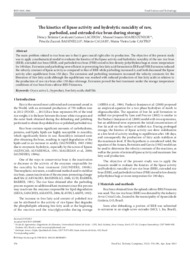The kinetics of lipase activity and hydrolytic rancidity of raw, parboiled, and extruded rice bran during storage.
The kinetics of lipase activity and hydrolytic rancidity of raw, parboiled, and extruded rice bran during storage.
Author(s): LACERDA, D. B. C. L.; SOARES JÚNIOR, M. S.; BASSINELLO, P. Z.; CALIARI, M.; CASTRO, M. V. L.
Summary: The main problem related to rice bran use is that it goes rancid right after its production. The objective of the present study was to apply a mathematical model to evaluate the kinetics of the lipase activity and hydrolytic rancidity of the raw rice bran (RRB), extruded rice bran (ERB), and parboiled rice bran (PRB) stored in low density polyethylene bags at room temperature for 180 days. Extrusion and parboiling were efficient in preventing free fatty acid formationin ERB and PRB.Extrusion reduced the velocity constant of lipase activity as compared to that of RRB while parboiling increased it, and both decreased the lipase activity after equilibrium from 150 days. The extrusion and parboiling treatments increased the velocity constants for the liberation of free fatty acids although the equilibrium was reached with reduced production of free fatty acids in relation to the production of raw rice bran after 150 days ofstorage. Extrusion proved the best treatment under the storage temperature conditions of rice bran from cultivar BRS Primavera.
Publication year: 2013
Types of publication: Journal article
Unit: Embrapa Rice & Beans
Keywords: Arroz, Byproducts, Free fatty acids, Oryza sativa, Rice, Shelf life, Subproduto, Ácido graxo
Observation
Some of Embrapa's publications are published as ePub files. To read them, use or download one of the following free software options to your computer or mobile device. Android: Google Play Books; IOS: iBooks; Windows and Linux: Calibre.
Access other publications
Access the Agricultural Research Database (BDPA) to consult Embrapa's full library collection and records.
Visit Embrapa Bookstore to purchase books and other publications sold by Embrapa.

